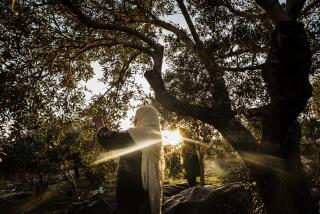Hashish Farmers Out in the Open Again
- Share via
BAALBECK, Lebanon — After years of concealing their operations, hashish farmers in the lush, Syrian-patrolled Bekaa Valley are openly working their crops and defending their businesses.
At four spots along the highway leading to the ancient town of Baalbeck, Bedouins, their heads covered with kaffiyeh , the checkered Arab scarf, work in broad daylight preparing tons of dry hashish piled in and around unfinished buildings.
“It’s my first day here. I’m paid 2,500 Lebanese pounds (about $5) a day,” said a 35-year-old Kurdish worker who was using a large wooden-framed sieve to separate cannabis from crushed dry hemp plants. Hashish is made from the resin in the flowering tops of hemp.
Although the man kept the shop’s metal door half-closed, much of the crop was clearly visible--and identifiable--from the Syrian-policed road yards away.
“The crop is for Abu Ali, the owner of the villa there,” said the worker, who declined to identify himself and kept on working, seemingly dazed by the hashish vapors that filled the concrete building.
In a recent survey, the weekly An-Nahar Arab International magazine showed that addiction among the farmers in the Bekaa Valley is very high. It said 30% of the people in an unnamed village near Baalbeck were heroin addicts and the remaining 70% smoke hashish.
Before the Lebanese civil war erupted in 1975, villagers used to grow the illegal plant on small remote patches away from the region’s main routes. On several occasions, the army stormed growers’ hide-outs. Many were jailed and some on both sides were killed.
Residents say hashish dealers now pay workers by the hour or day to cut down the hemp stalks, grind and sift the product and make hashish at clandestine laboratories scattered across the valley. It has become a thriving business.
Farmers who earn thousands of dollars from their lush fields fiercely defend their work.
“Four years ago, I decided to repent,” said Hajj Issam, 60, as he looked out at a vast, rain-drenched field behind his two-story home south of Baalbeck. “I decided to plant potatoes.
“But I plunged into poverty. The price of potatoes was low and the villagers here do not get any form of help from the government or foreign institutions, so I resumed dealing with hashish to earn more money.”
Although several villagers claim that hashish doesn’t earn them much money anymore, some manifestations of wealth are obvious. Outside well-furnished houses are parked the latest models of Mercedes-Benz and BMW.
A 40-year-old man who was overseeing six workers grinding hemp at his shop along the main highway defended his business, stressing the high cost of living caused by the civil war.
“I don’t smoke or smell hashish,” he said. “I plant it because I need money.”
His wife, who was carrying a baby in her arms, and his father and sister agreed.
“Our choices are limited here,” he said. “For people like us, we either have to plant hashish, steal, join the divided army or the (Iranian) revolutionary guards for 60,000 pounds ($122) a month.
“For example, the cost of kerosene for our heaters is 50,000 pounds (about $102) a month, so how do you expect one family to survive?”
Residents say that the Iranians and the Tehran-backed Hezbollah, who maintain a strong presence in the region, have advised against dealing drugs.
“Some clergymen say, ‘Stop dealing with hashish,’ but we reply, ‘Give us the alternative,’ ” said one resident, who requested anonymity.
Authoritative sources say that villages around Baalbeck produce at least 155,000 pounds of hashish each year.
“Maybe hashish is a bit more harmful than cigarettes, but it stimulates appetite,” said one young farmer.
Local officials say they believe that farmers will use force against anybody who tries to stop their business.
“Unfortunately, many believe that it is a matter of life or death,” said local journalist Hassan Darweesh.
More to Read
Sign up for Essential California
The most important California stories and recommendations in your inbox every morning.
You may occasionally receive promotional content from the Los Angeles Times.













